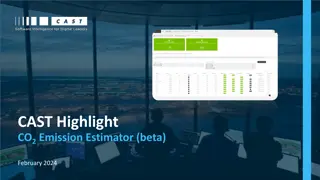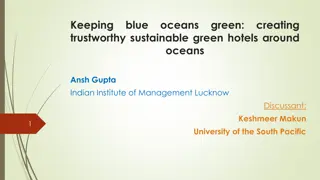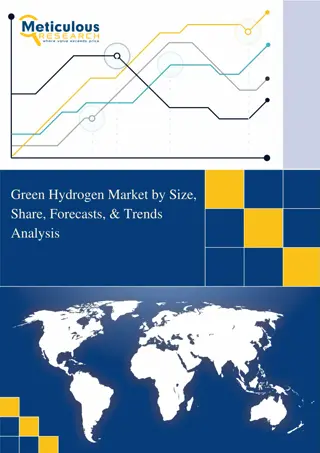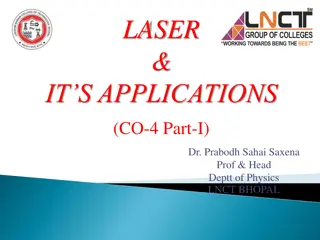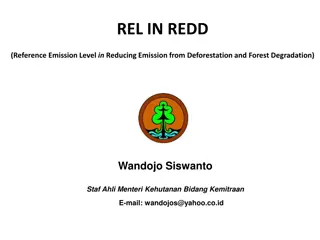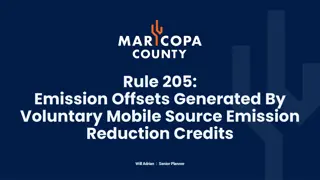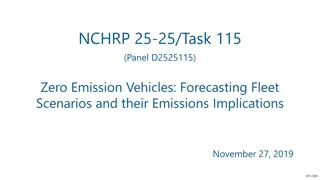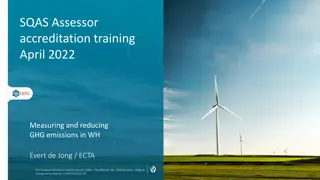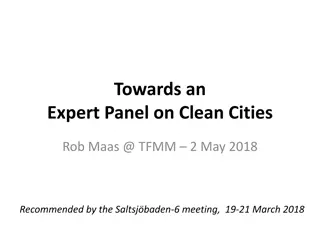Future Green Jobs for Emission Reduction
Discover the green jobs of the future that directly contribute to emission reduction and environmental protection. Learn about reaching net zero, distribution of green jobs, skills needed, and key recommendations for the transition. Find out how the West of England Combined Authority is leading the way towards a greener economy.
Download Presentation

Please find below an Image/Link to download the presentation.
The content on the website is provided AS IS for your information and personal use only. It may not be sold, licensed, or shared on other websites without obtaining consent from the author.If you encounter any issues during the download, it is possible that the publisher has removed the file from their server.
You are allowed to download the files provided on this website for personal or commercial use, subject to the condition that they are used lawfully. All files are the property of their respective owners.
The content on the website is provided AS IS for your information and personal use only. It may not be sold, licensed, or shared on other websites without obtaining consent from the author.
E N D
Presentation Transcript
Careers Leaders and Teachers What will the green jobs of the future be? Use this resource to find the answer and to align your careers programme with the Labour Market Information contained within the Green Skills Market Analysis report for West of England Combined Authority. A job which will directly contribute towards the reduction of emissions and help to protect the environment The definition of a green job West of England Combined Authority
How to use this resource 5 minutes? Flick headings and contents page for an overview 30 minutes? Read slides to be able to share info with students The aim is to inform schools of the Green Skills labour market More time to delve deeper? Read notes on each slide with page references to the Green Skills Market Analysis report Holiday Read? Green Skills Market Analysis , Retrofit Report and then Sustainability & Climate Change .gov.uk
Contents 1 13 Overview How to use this resource Contents Net Zero Need and distribution of jobs Types of jobs Reskilling opportunities Skills in the green economy Technical skills Construction and Installation Construction and Installation Operation and Maintenance Manufacturing Other Green Jobs Digital skills and coding Environmental Law Environmental Consulting Low Carbon engineering Nuclear Aerospace WEIoT Stem 2024 Electric Vehicle charging points Solar Photovoltaic Key Recommendations 2 14 3 15 4 16 5 17 6 18 7 19 8 20 9 21 10 22 11 23 12 24
What does it mean to reach Net Zero? Net Zero means getting a balance between the carbon released into the atmosphere, and the carbon taken from it West of England Combined Authority have produced a Climate Emergency Action Plan which sets out five key areas for action towards reaching net zero, and they recognise that a skilled and motivated workforce is needed to deliver this. Low Carbon Transport System Low Carbon Business Renewable Energy Low Carbon Buildings and Places The Green Environment Meeting Net Zero and creating actual growth is dependent on addressing existing skills gaps and making efforts to mitigate against new ones.
Need & Distribution of Jobs 52% will be in Construction & Installation This is mainly retrofitting existing buildings with energy efficiency measures and low carbon heat as well as construction and installation of low carbon electricity generation. Green jobs will need to increase by over 50,000 to meet net zero targets by 2030 (West of England Combined Authority region) 38% will be in Operation & Maintenance 10% will be in Manufacturing West of England Combined Authority will build on existing advanced manufacturing sectors in composite materials research and engineering Most jobs will be in the low carbon services such as low carbon advisory, digital and green finance
Types of Jobs In 2020 it is estimated that within the West of England Combined Authority region, there were around 6,250 low carbon jobs Jobs that: installers Use low carbon heat sources such as heat pump Are energy efficiency such as retrofitting buildings Create low-carbon processes, materials, tools and appliances Decarbonise electricity through nuclear, solar and onshore wind Decarbonise emissions from road transport
7Reskilling Opportunities Teachers/Parents can see the transferable skills needed for new green sector jobs by referring to the table below: Traditional Job role Transferable Skill Low carbon Job Role Electrician Skilled and qualified to work with electricity Solar panel Installer Heat pup Installer Plumber Skilled and qualified to work with domestic water Financial Analyst Numeracy and knowledge of the financial sector Green Financial Analyst Experience of tools, health & safety, and building Energy Efficiency Construction worker Computational fluid dynamics modelling Wind Turbine Engineer Gas turbine Engineer Structural Engineering Heat Network Engineer Civil Engineer Understanding and qualification in law Environmental Lawyer Lawyer laying pipes for highly flammable gases Hydrogen Network Gas Network Engineer Accountancy & numeracy Accountant Carbon Accountant handing of refrigerant Heat Pump Air conditioning
Skills in the Green Economy Soft skills What skills will a young person need to find success in the Green Economy? High Level Skills Innovation Communication Public Relations Emotional Intelligence Project Management Effective Leadership Problem Solving Attitudes and behaviours Behaviours and work readiness required to enable continued adaptability Intermediate Level Skills Communication Strategic Thinking Client Relationships Task Management Low Level Skills Communication An understanding of the green agenda expressed through personal behaviours and opinions
Technical skills plus 1 2 Engineering businesses want increased engagement including opportunities for work experience between education and business to improve work- readiness of new recruits. Supporting the links between engineering firms and the education system is one of the ways West of England Combined Authority can help address these engineering skills gaps. knowledg e knowledge
Construction and Installation Retrofitting existing buildings with energy efficiency measures and low carbon heat Construction and installation of low carbon electricity generation. 11,000 jobs in the installation of heat pumps. 3,500 jobs related to low carbon electricity generation in solar wind and nuclear 4,000 jobs in the installation of energy efficiency measures 2,500 jobs in installing insulation
Construction and Installation Key careers include those listed below: The chart shows possible academic pathways Homes for the future innovation centre Northumbria Uni 1.Architectural Technologist PhD 8 Advanced home futures Offsite Housing Constriction Teeside Uni University of Wolverhampton 2.Architectural Designer 3.Digital Design Technician 7 MSc 4.BIM Technologist Innovative home design + Construction Design for future living Teeside Uni Birmingham City Uni 6 BA/BSc 5.Housing Design Technician LVL 4/5 students can progress to degrees or employment 6.Off-Site Construction Future Homes Design & Construction Pearson 7.Planning Officer 5 HND 8.Building Control Officer Future Homes Design & Construction Pearson 4 HNC Construction & the Built Environment Pearson 3 BTEC Schools
Operations and Maintenance 800 jobs in sales, marketing and management of the drive for insulation 1,200 jobs in environmental consulting 4,000 jobs in low carbon advisory roles 4,600 jobs in supporting digital roles 750 Jobs in monitoring and maintenance of solar power 900 jobs in operation, monitoring and maintenance of nuclear power 900 jobs in the green finance sector
Manufacturing Through efficiency improvement design, development of sustainable aviation fuels, > 800 jobs in decarbonising aerospace > and the manufacturing of components that reduce aerospace emissions and composite materials researcher and production 800 jobs in energy efficiency measures. These include efficient lighting, insulation, controls and monitoring The programme for the retrofitting of buildings will create many of these jobs 500 jobs in nuclear energy
Other Green Jobs Most jobs will be created in the low carbon heat sector (33%), particularly heat pump installers. Demand for jobs in energy efficiency will rise sharply to account for 17% of total additional low carbon jobs needed by 2030. Around one-quarter of jobs needed by 2030 will be engaged in low-carbon services such as green finance, digital and advisory services (legal and technological) Around 15% of jobs will be required to decarbonise electricity namely in sub-sectors such as nuclear, solar PV and onshore wind
Digital skills and coding RETROFITTING HOMES Computer Modelling and 3D printing. Coding to develop applications/software for smart homes The Green Agenda will drive further development of new technologies using Virtual Reality and Augmented Reality and big data. It will change the culture of the construction sector and make engineers and electricians into the IT specialists, software managers and system designers of the future. DECARBONISING INDUSTRY Machine Learning and Artificial Intelligence I to drive efficiencies DECARBONISING THE GRID Advanced weather monitoring predict generation of renewable energy assets. GIS software and skills for evaluating site feasibility for renewable energy DECARBONISING TRANSPORT Smart chargers for electric vehicles
Environmental Law There are legal apprenticeships within the UK, which range from Level 2 to Level 7. A fast-growing sector Areas include environmental pollution and renewable energy generation. The majority of the existing workforce sit in the high qualification level (approximately 75%, with 15% at the intermediate level and 10% at the low level). As an environmental lawyer, most jobs will involve advising large organisations of their risks and defending them if legal action occurs. Broadly speaking, the legal profession in England and Wales is divided into two: Solicitors and Barristers and the professional education requirements differ between the two routes University degrees remain the primary route. Either a full law degree (LLB) or an undergraduate degree in a different discipline and to then a Graduate Diploma in Law (GDL) or a Common Professional Examination (CPE). There will be some opportunities in the area of non- governmental organisations (NGOs). Individuals are increasingly entering the Environmental Law sector directly. Once working for a private firm, specialising in environmental law can be an option.
Environmental Consulting Employment in environmental consulting requires a degree (often postgraduate) in environmental science, environmental studies or a related subject such as ecology, biology or agricultural science. Specialisms Air, land and water contamination; environmental impact assessment and flood risk; and waste management and recycling. Jobs require a high qualification level, at the minimum NVQ level 6 as well as some work experience. Volunteering is a useful first step into this sector. Undergraduate and postgraduate courses at The University of the West of England and The University of Bristol. Employment in environmental consulting will need to grow significantly to ensure nature and the environment are protected. Bristol has opportunities for career development in the environmental sector, with the head offices of both The Soil Association and The Environmental Agency based in the city. The Soil Association offers volunteering opportunities helping prospective environmental sector employees gain the experience needed for employment.
Low Carbon Engineering Engineering skills are needed for low carbon electricity generation, transport, alternative fuels and heat. The SW region is important for nuclear, low carbon aerospace and maritime design. Engineers will be required for site design, installation and maintenance of a broad range of infrastructure: Solar farms design, construction, and maintenance Calculating correct sizes of heat pump and radiators Connecting solar farms to the grid Civil Engineering Electrical and Electronic Engineering Engineering Mathematics Mechanical Engineering Engineering Design Architecture and Environmental Engineering Automotive Engineering A broad range of engineering courses are offered at universities within the region, including the University of Bristol and the University of the West of England. Listed are some relevant courses to the low carbon sector
Engineering sectors in the region: Nuclear Jobs in the Nuclear sector include existing generation, decommissioning, nuclear defence and civil new build. 25% of recruitment in 2018 into the Civil Nuclear Sector came from Apprenticeships or Graduates Training schemes including Kickstart, Apprenticeships, Bootcamps and Restart will encourage more young people and women into the nuclear sector.
Aerospace Emissions reductions in the short term demand management, efficiency improvements, advanced materials, sustainable aviation fuels (SAFs), fibre optics, photo electric cells Currently there are 180 aerospace companies in the region, employing over 9,000 people Emissions reductions in the future will be hydrogen and electric planes Very few of these employees could currently be categorised as working in the low carbon sector Emissions savings due to increased efficiency and sustainable aviation fuels will require a highly skilled workforce with a focus on STEM The majority of roles are in engineering aerospace but other degrees in Materials Science, IT, Business and Finance are needed. The University of Bath, University of Bristol and University of the West of England all offer MEng Aerospace Engineering, with opportunity for industrial experience and some offer pilot studies.
The West of England Institute of Technology (WEIoT) Has been developed in response to demand for engineers which is a collaboration between five education partners and employer partners. By 2024, the region aims to deliver Science, Technology, Engineering and Maths (STEM) to over 2000 individuals Learners will study at least a Level 4 Qualification and over 96% of learners will be focused on technical disciplines. It will equip people with the skills to fully participate in, and contribute to, economic growth driven by digital innovation and emerging technologies. One of the core disciplines is Advanced Engineering and High Value Manufacturing and a range of colleges are collaborating within the space. Colleges collaborating on Advanced Engineering and High Value Manufacturing
Electric Vehicle (EV) Charging Points Bristol and Bath Science Park 70 million automotive propulsion research facility is part of the Institute for Advanced Automotive Propulsion Systems (IAAPS). Young people will see electrical engineering as more attractive as it is linked to the automotive sector Those attracted to careers in the automotive sector need to be aware that electrical engineering will be increasingly important.. The sector needs: highly trained graduates (Level 5 and above) Entry Level Apprentices (Levels 3-4). The sector is missing: Deep technical knowledge Business acumen
Solar photovoltaic (PV) The uptake of solar PV may start to increase again as the technology continues to fall in price and improve in performance. West of England Combined Authority has a good solar resource relative to the wider UK which is an asset to the region Forecasts from the International Energy Agency (IEA) predict that solar power costs will continue to reduce by 15% to 35% between 2020 and 2024 The primary labour demand is focused on the installation process, with a single installation generally taking between one to two days and requiring two to four Installers Across the UK, household uptake of solar PV has increased dramatically over the past ten years, rising from under thirty- thousand solar PV sites in 2010 to over a million in 2019 Skills and Knowledge needed: Strength, manual dexterity, problem solving and perception skills, understanding complex detailed information, ability to visualise outcomes. A detailed knowledge of tools, procedures and processes are required but covered through training.
Key Recommendations Pioneering work is underway within the region to develop the skills base required to enable the low carbon transition. There is a need to focus on the green agenda more widely as part of primary and secondary level education. There is an opportunity to integrate these topics into extra curricula activities. The Cabot Learning Federation Student Parliament provides an opportunity for pupil representatives from all CLF schools in North Somerset, Bristol and South Gloucestershire to discuss key issues. There is a willingness amongst Further Education (FE) Colleges in the region to develop their training provision to better encompass the green agenda . Most training provider respondents indicated that none of their courses directly target green/retrofit jobs





